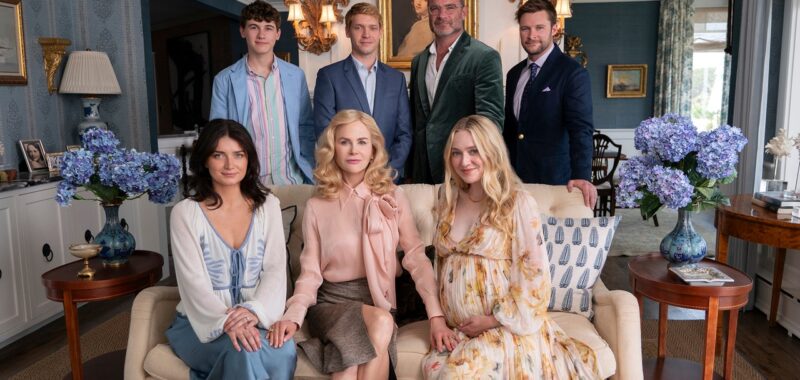The following article contains minor spoilers for The Perfect Couple.
The Aperol-hued sun dips over the sea off the Nantucket coast. On the beach, the family and guests of Greer Garrison Winbury (Nicole Kidman), a famous crime novelist, assemble to rehearse the next day’s wedding between son Benji (Billy Howle) and bride Amelia (Eve Hewson). The ultra-wealthy Winburys are uniformly beautiful, like a line-up of porcelain dolls with expensive dental plans; the help watches over them from afar, ready to sweep up smashed champagne flutes and hand out hors d’oeuvres. Conversely, Amelia’s parents are simple folk dressed by TJ Maxx.
Dusk turns to night, and the evening of dancing draws to a close. The morning after, the house awakens to a scream: Amelia’s best friend, social media personality Merritt Monaco (Meghann Fahy) has been found face-down in the drink. And so the remaining five episodes of Netflix’s The Perfect Couple, directed by Susanne Bier and created by Jenna Lamia—adapted from the mystery-thriller written by Elin Hilderbrand—concern the age old question at the heart of all good murder-mysteries: whodunnit?
The genre has been around forever, but shows and films released in the last decade or so like The White Lotus, Knives Out, Only Murders in the Building and—surely the blueprint here—Kidman’s own Big Little Lies, have led it to an impressive renaissance. They’re easy to watch, for one, and the best ones are endlessly compelling, with an air of interactivity: they invite us to play armchair detective, working out who from the line-up of assembled ne’er do wells could’ve done the grisly deed. Such is why page-turning mystery novels like Hilderbrand’s The Perfect Couple are the cornerstone of any holiday reader’s pile of airport-purchased beach reads. And so, in the streaming binge-watch era —when we have become accustomed to devouring a new show in a weekend—it’s hardly a surprise that the most easily watchable genre has seen an uptick.
The Perfect Couple is the perfect Netflix binge-watch for the reason that it’s a fun, light-hearted, engaging mystery miniseries that you can get through in a little over five hours. And as tends to be the case with Netflix—hail to the streaming budget—it’s technically well-crafted. The costuming is gorgeous, as is the production design, with most of the series’ twists and turns taking place within the confines of Winbury’s expansive Nantucket estate. The prize gem of which is the old-money manor house at its centre, which boasts luxurious views of the glistening coastline from every side (or so a luxury real estate broker from Selling Sunset would put it). The whole thing screams opulence.
But the real secret sauce is in The Perfect Couple’s cast, who line up like the characters on a Cluedo board, all with their own motivations to drown poor Merritt. There’s Kidman’s Greer, the stern matriarch with a trans-Atlantic accent who would kill for her family (here’s another classic of the “Nicole Kidman wears a great wig” genre). Her unassuming pot-smoker husband Tag, played by Wes Anderson favourite Liev Schreiber, seems to put up an unnerving front. And what of the groom, Billy — why was he trying to call Merritt on the run-up to the wedding? And on it goes, with each episode dedicating at least some of its runtime to each family member and guest being called in for interrogation by stern detective Henry (Donna Lynne Champlin) and deferential police chief Carter (Michael Beach), the latter wary of upsetting the apple cart as the Winbury family are prominent local benefactors.
It soon becomes clear that the Winburys are a house of cards that has been waiting to tumble; all it takes is the gust of homicide for everything to fall apart. And so the series whips by in a flash, brimming with intrigue, exposed familial taboos, and twists that you sort of mostly see coming but nevertheless satisfy when they arrive. It seems inevitable that The Perfect Couple will be a huge, algorithm-supported hit for Netflix, who may just have the next White Lotus on their hands. Hey, it’s better than blood.
This story originally appeared in British GQ.

